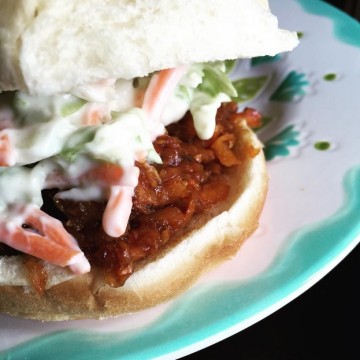When I first moved back home to Nashville, Tennessee from Portland, Oregon, I went to a local restaurant with an old friend. We were starving, and after glancing at the menu full of meat, dairy, and meat smothered in dairy, I quickly ordered a side of their seasonal vegetables without much thought. But when the waitress brought our food I found myself staring down at a bowl full of vegetables soaking in melted butter. As a native Southerner, I laughed at my own mistake. How could I forget that everything here was covered in butter? The answer was easy: Portland spoiled me. It was a wonderful city where I could walk a block from my apartment and order some of the best vegan food in the country. In fact, all of the restaurants there had multiple options and it didn’t take long before I forgot the struggle that was eating out in the South.
That’s not to say a lot hasn’t changed for the better. These days, the local grocery has a health foods section stocked with plenty of products and it is actually possible to stumble upon a vegan or vegetarian restaurant. Yet it wasn’t that long ago when most people here had never even heard of the word vegan and if you wanted any sort of animal alternative it could only be found at Whole Foods or made from scratch at home. Because of those trying times, I was able to perfect the skill of being vegan in the South, an expertise that extends beyond simply ordering at restaurants to a craft that has allowed me to keep my sanity throughout all these years. So, without further ado, here are my top eight tips to guide you.
1. Look at the listed ingredients on the menu and not the food items
When you get the menu, read over the descriptions of the food being offered. Cheeseburgers? What comes on them? Wraps? What’s in them? You’ll often find all of the ingredients needed to make a great meal. You can add those items to a salad or make your own wrap. Don’t forget the side items. Southerners love fresh vegetables so pick a few and create a veggie plate!
2. Assume everything will be covered in butter and made with meat—because it is
Traditional southern food is essentially a heart attack on a plate. There will always be butter and even the vegetables sometimes have chunks of meat in them. Ask your server which items are okay for you to eat. Personally, I never order pinto beans, black-eyed peas, or green beans because they’re always cooked with meat. It may also be more helpful to say you have a food allergy, because while people may have heard of the word vegan that doesn’t mean they actually understand its meaning.
3. Be prepared for interrogations
In the South, meat is a staple at every meal. Because of this, it is nearly impossible for people to understand how you’re still alive without it. When people learn that you’re vegan you’ll be bombarded with a line of questions. The most common: “Where do you get your protein?” “There’s protein in that?” “What can you even eat?” “Why would anyone be vegan?” The level of concern that will arise over your health is endearing, really.
4. And aggressiveness
Southerners are some of the nicest people you’ll ever meet but they don’t take kindly to what goes against their traditions. While the question, “Why are you vegan?” may seem like a great opportunity to transition into the fact that animals don’t deserve to die to fill your stomach and that they are intellectual beings with feelings and thoughts, be prepared to be met with aggression. Hunting is a large component of Southern culture and that means they not only enjoy eating meat, they also like killing animals. When you challenge that, it makes them angry. You will hear a wide variety of arguments: “I’m a conservationist,” “The deer are overpopulated,” “Animals die when you harvest crops anyway.” I’ve even been told that vegans die earlier than meat eaters because “it’s just not healthy not eating meat.” Enter those conversations at your own risk, just remember I did warn you.
5. Plan ahead
When going to a more upscale restaurant, if you call ahead and provide some warning, the chef will often have no problem preparing a vegan meal for you that night. It may also be beneficial to take a look at the menu before arriving to get an idea of what you may want to order.
6. Learn to cook
Most vegans know how to cook. Why? Because you can’t always find what you’re craving made without dairy or meat products. I encourage all of you to try making your own Southern meal at home—fried chick’un, mashed potatoes, or vegan mac n’ cheese. You’ll have fun and eat some delicious food.
7. Have a Sense of Humor
You’re probably not going to convert every person you meet into a vegan or vegetarian, but that doesn’t mean they’re bad people. I have many friends that will order food for me and jokingly ask if I want extra bacon. Instead of getting upset, I go along with the joke. By having a sense of humor, you’re inadvertently causing them to think about their meal choices and often that will encourage them to try some of your vegan food. And guess what? Sometimes they even enjoy it and will have it again. Think small steps.
8. For Southerners- Fried Food is NOT Vegan
If you aren’t from the South this seems like a no-brainer. It is common knowledge that anything fried typically contains milk and egg. However, after being vegan for almost ten years (or so I thought), I was at lunch with my sister and ordered fried okra. She stared at me like I was crazy and proceeded to remind me that fried okra is in fact, not vegan. To my dismay, I realized I had never even thought about it. Fried foods are so much apart of southern culture that I never even took the time to think about the batter. And I’m not the only one, I’ve watched many friends make the same mistake too.
Let’s hear it from all you vegans in the South! What tips have helped you out?
Related: 4 Tips to Ordering Vegan at Non-Vegan Restaurants
Vegan Travel in Southeast Asia
__
Photo: Sarah Does Fitness via Instagram





